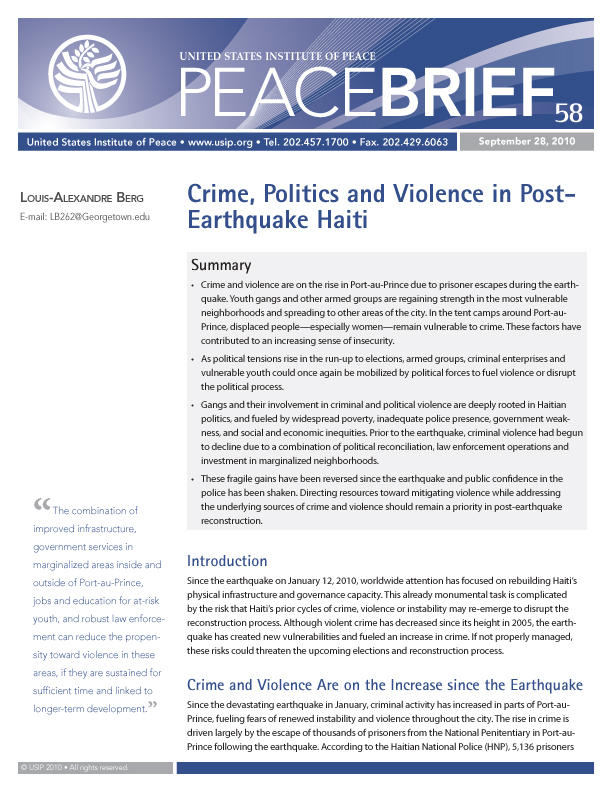Crime, Politics and Violence in Post- Earthquake Haiti
This Peace Brief was prepared by Louis-Alexandre Berg, a Jennings-Randolph Peace scholar at the U.S. Institute of Peace (USIP) and a rule of law adviser at the U.S. Agency for International Development (USAID). It is based on research conducted by the author in Haiti in July 2010, aimed at assessing vulnerabilities to conflict and instability in the post-earthquake period.

Summary
- Crime and violence are on the rise in Port-au-Prince due to prisoner escapes during the earthquake. Youth gangs and other armed groups are regaining strength in the most vulnerable neighborhoods and spreading to other areas of the city. In the tent camps around Port-au-Prince, displaced people—especially women—remain vulnerable to crime. These factors have contributed to an increasing sense of insecurity.
- As political tensions rise in the run-up to elections, armed groups, criminal enterprises and vulnerable youth could once again be mobilized by political forces to fuel violence or disrupt the political process.
- Gangs and their involvement in criminal and political violence are deeply rooted in Haitian politics, and fueled by widespread poverty, inadequate police presence, government weakness, and social and economic inequities. Prior to the earthquake, criminal violence had begun to decline due to a combination of political reconciliation, law enforcement operations and investment in marginalized neighborhoods.
- These fragile gains have been reversed since the earthquake and public confidence in the police has been shaken. Directing resources toward mitigating violence while addressing the underlying sources of crime and violence should remain a priority in post-earthquake reconstruction.
About this Brief
This Peace Brief was prepared by Louis-Alexandre Berg, a Jennings-Randolph Peace scholar at the U.S. Institute of Peace (USIP) and a rule of law adviser at the U.S. Agency for International Development (USAID). It is based on research conducted by the author in Haiti in July 2010, aimed at assessing vulnerabilities to conflict and instability in the post-earthquake period.
The views expressed by the author are entirely his own and do not reflect those of USAID or USIP, which does not advocate specific policy positions.

